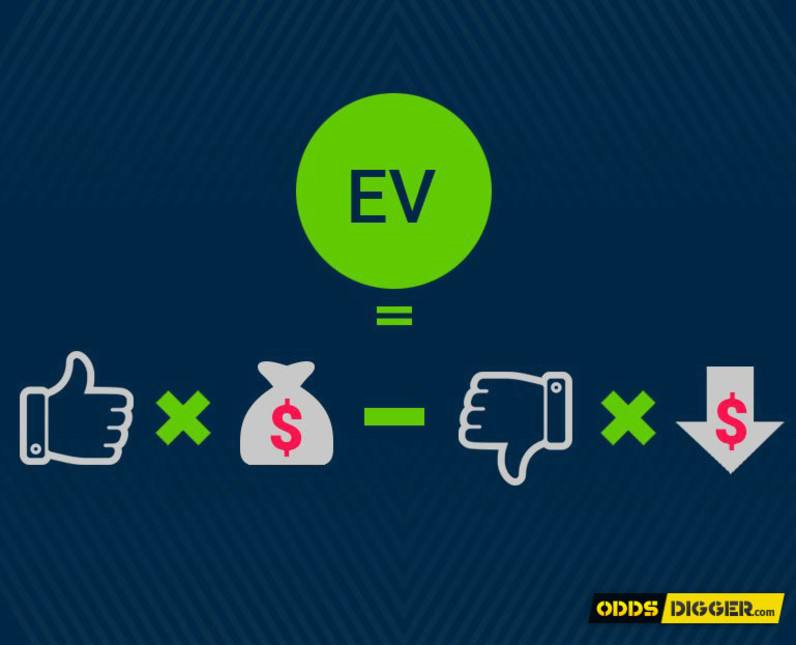
- OddsDigger
- Blog
- How to Calculate Expected Value in Sports Betting: EV Calculations Explained
How to Calculate Expected Value in Sports Betting: EV Calculations Explained

The expected value is one of the key terms in sports betting, as it denotes the value that a punter can expect to win on each bet. As a result, it happens to be an extremely important calculation – especially when it comes to comparing the odds from different bookmakers. Even if a punter is going with odds from an exchange, the expected value is a figure that plays a crucial role in order to determine the value of that specific bet.
Our partners: 777Spinslot is a reliable gaming platform that constantly upgrades its assortment of games to get better results and to bring customers the highest quality free slots bonus no deposit to play with.
What is the Expected Value in Sports Betting?
Expected Value Definition
The expected value definition is the return that a particular bet can provide. This value can be calculated using a range of statistics and probability. The process of calculating expected value is done by multiplying the potential outcomes by the number of times the outcome that could occur. Now, the values can be summed up to provide an expectation value. This process is slightly different when it comes to sports betting alone.
Why is it Important?
There is a huge need in order to work at bets odds as it would provide an insight into the value that is being provided by the bet. Since each bet happens to come with a lot of variance, it is quite possible that the odds can end up losing the punter a lot of money. However, it is possible to go with a large number of correct decisions when choosing bets that have a positive expected value. This will make a punter profitable over the longer period.
Calculating Expected Value in Sports Betting

Even though it is one of the most important concepts for a punter, the process of calculating the value is rather easy. The EV formula is available for a number of circumstances and it will be able to quickly provide the value of bet. The formula is:
(Probability of victory) × (stake on a bet) – (probability of loss) × (stake lost on the bet)
How to Calculate Expected Value: Example
This formula can be used to quickly calculate the expected value in a sports bet or any other bet for that matter. Let us consider the example of a match between Chelsea and Stoke City. The former are given odds of 1.40 while Stoke City are at 13.50 for a win. Let us also assume that a draw is at 6.50. If the punter is coming in with a bet of £10 on Stoke City, they stand to receive a sizeable £125 in winnings. The probability of this occurrence happens to be only 7.4%. The probability of a different result happens to be the sum of a Chelsea win and draw – which is at 0.714 +0.153 = 0.867. Now, the calculation in this expected value example looks like:
(0.074 x £125) – (0.867 x £10) = £0.58
Based on the outcome, a punter stands to gain around £0.58 on each £10 that has been bet.
EV Calculations of a Single Bet
It is possible for a punter to calculate the EV of a single bet. For example, if a punter wants to back Chelsea to beat Manchester City in the Premier League but wants to know the EV of that specific bet. In this case, let us assume that the odds are 8/1. For every outcome, that happens to be a fair price that is in the positive EV value. In the case of this selection, the best odds would be 7/1. Since the punter is placing money on a bet valued at 8/1, the process of finding expected value for the single bet is as follows: 8/7= 1.14 = +114%. Hence, the expected value of this example is at +14%.
However, arriving at the fair price for a sports event happens to be one of the toughest jobs.
What is The Expected Value of a Turnover?
The ‘turnover’ is a term that is used to denote multiple sports events that have been bet upon. In order to assess the expected value of a turnover, one can go with the assessments on an individual level. However, it is not always the fastest way and it is almost not feasible when it comes to a large selection of data. A punter can estimate the EV of a turnover if they are able to come up with an overall profit margin based on the betting strategy.
On a simple scale, a punter with a success rate of 7% with a total stake of £100,000 will be able to come in with an earnings of £100,000 X 7% = +£7000.
At the opposite end, a punter who has a success rate of -4% with the same stake will be losing -£4000.
Expected Value of a Matched Bet or Arb
A matched bet is a common phenomenon when it comes to sports betting, and it is possible to apply the EV concept in order to find the true value of the bet. The expected value does not happen to be an estimate in the case of a matched bet, as the punter will have some knowledge about the potential earnings from a combination bet. A punter would have usually gone with a stake that guarantees some kind of return irrespective of the outcome. Here are the ways that an expected value plays its role in the matched betting scenario:
- Matched Betting: the -EV is typically given to the qualifying bet so as to signify that money would be lost. However, the process of earning profits through the free bets results in a +EV in the overall sense.
- Arbing: the +EV his for all the combination bets. The punter gets a profit when both ends of the bet are settled.
When Does Expected Value Matter?

The concept of expected value is not important for someone who is betting for fun. If a specific bet has been found to have a 0.96 EV (expected value), then the player stands to get back £0.96 for every £1 which has been wagered. This denotes that £0.04 goes into the bet as the house advantage. This house advantage differs from one bookmaker to the other and it is also applicable in the case of casinos. It is one of the reasons for the popular saying of casino/bookmaker always coming on top.
The expected value figure matters when the punter is entering into the bet with a serious ambition of making money or at least not losing the stake. Even in terms of sports betting, it is possible for a punter to swing the house advantage in their favour. It would not be surprising to see a good punter with an edge over the bookmaker.
How Expected Value Helps Sports Bettors
The expected value is a key strategy employed by sports bettors, but there are a few misconceptions about the strategy. It is common for newcomers to take a negative EV as a sign of an imminent loss. However, it is not necessarily the case since the odds in the case of sporting events are highly subjective. The punter stands to make money if they just manage to outsmart the bookie.
The best idea for a sports bettor is to come up with own odds for a specific sporting event, and it is imperative that the figures are not inspired or taken from the odds provided by the bookmaker. Now, these two odds can be compared so as to find the occurrence of a positive EV. This substantially increases the chances of success. In the earlier Chelsea vs Stoke City example, let us consider that Stoke City’s chances of success is at 11% instead of 7.4%. In this scenario, the EV jumps to a value of £5.08.
How to Identify Value Bets
One should not discount selections with negative EV, as it does not straightaway imply the possibility of losing money. Hence, the individual calculations made on a sporting event can then be compared with the actual odds provided by the bookmaker. One of the imperative actions necessary to find the Value bets is to come up with own odds for a specific sporting event. This would come only with the greater understanding of the market. This knowledge will also help identify the odds that have a lot of variation from your expected probability, thus translating into positive EV.
Conclusion: Apply This To Betting
Expected Value definition shows that this betting strategy is all about finding the value in a bet more than anything else. It is one of the several strategies that a punter can use in order to become successful at each bet. After all, every punter wants the bets to succeed, but they should be in a position to take a significant advantage over the bookmaker. This can only be done by searching for value in the bets, and this is where the expected value concept plays a crucial role. It can be used to increase the size of the wins and lower the size of the losses.
